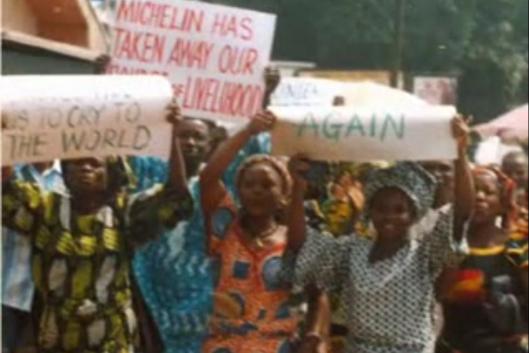In his novel “The Invisible Man”, H.G. Wells tells the story of a scientist who succeeds in making himself invisible, and the problems that unfold as a result.
In real life, women have been struggling for many years against the problems caused by the social invisibility to which they are subjected, in which most of the work they do is equally invisible and greatly undervalued.
And although women wage this battle on a daily basis, the 8th of March – International Women’s Day – is a good opportunity to give greater visibility to their struggle.
Issue 140 – March 2009
Women’s voices on plantations
THE FOCUS OF THIS ISSUE: WOMEN’S VOICES ON PLANTATIONS
Communities in the South are being affected by the spread of monoculture tree plantations and women are the most impacted by them. Over the past months, WRM and Friends of the Earth International organized jointly three workshops with local women: one in Asia (Papua New Guinea), one in Africa (Nigeria) and one in Latin America (Brazil). The main reason for choosing cases in those countries was that all had something in common: the direct or indirect involvement of the European Union in the spread of such plantations.
The importance of the EU involvement in the three cases is that within the industrialized North, the European Union is perhaps the one that has developed more gender-sensitive policies, both applicable at the internal and external level. It was therefore felt that there was a need to document the contradiction between what those gender policies say and how other EU policies result in specific impacts on women in the South.
Of course the findings are also applicable to policies and corporations from other countries –North and South- involved in the promotion of monoculture tree plantations.
WRM and Friends of the Earth’s Forest and Biodiversity Programme wish to thank all the women that participated in the workshops and shared their experience with us. At the same time, we wish to use the opportunity of this symbolic date –March 8th, International Women’s Day- to pay homage to the courage of the countless women that are fighting back and making their voices heard.
WRM Bulletin
140
March 2009
OUR VIEWPOINT
THE EUROPEAN UNION DISEMPOWERING WOMEN
-
30 March 2009Vast areas of land where diverse and rich ecosystems predominate are being replaced with large scale tree plantations in the South. These plantations –whether eucalyptus, pines, rubber, oil palm or other- are resulting in serious impacts on local communities, who see their ecosystems and livelihoods destroyed to make way to industrial tree plantations. Apart from affecting communities as a whole, they result in specific and differentiated impacts on women which translate in their disempowerment.
-
30 March 2009Oil palm production is increasing in Papua New Guinea, a country where 97% of the land is communally owned and most of its 5 million population still lives in the rural area and rely on subsistence farming for their livelihoods. The palm oil produced is mostly exported to the EU with the UK, Italy and the Netherlands being the main markets. A hidden large-scale scheme
-
30 March 2009“I don’t want money. I want my land back…if they give me one million Naira [the local currency] today, I will still go broke, but if I have my land I can always farm to take care of my family and possibly pass the land on to my children.”(Woman from Iguoriakhi) The France-based transnational company Michelin, one of the major players in world tyre production, has quite recently established rubber plantations in Nigeria.
-
30 March 2009World consumption of paper has exploded over the past 50 years. Only about 1/3 of paper production is used for writing and printing paper, most of it is used for advertising. And almost half of all paper produced is used for packaging.
TOOLS FOR ACTION
-
30 March 2009If after reading the above articles you (as a woman within an organization, as a member of a women’s movement, as an activist on human rights issues, as an environmentalist, as a journalist, as a member of a consumer’s association, as a campaigner on climate issues, trade issues, health issues, etc) are wondering what you can do to start making changes to the current situation, we have some ideas that we hope may be of use.
-
30 March 2009WRM has a special section on Women, Forests and Plantations in its web site, which can be accessed at http://www.wrm.org.uy/subjects/women.html The section includes a report on “The role of the European Union in disempowering women in the South through the conversion of local ecosystems to tree plantations”. The report, released on March 2009, summarizes the results of three workshops on the impacts of plantations on women held in Nigeria (rubber), Papua New Guinea (oil palm) and Brazil (eucalyptus).

